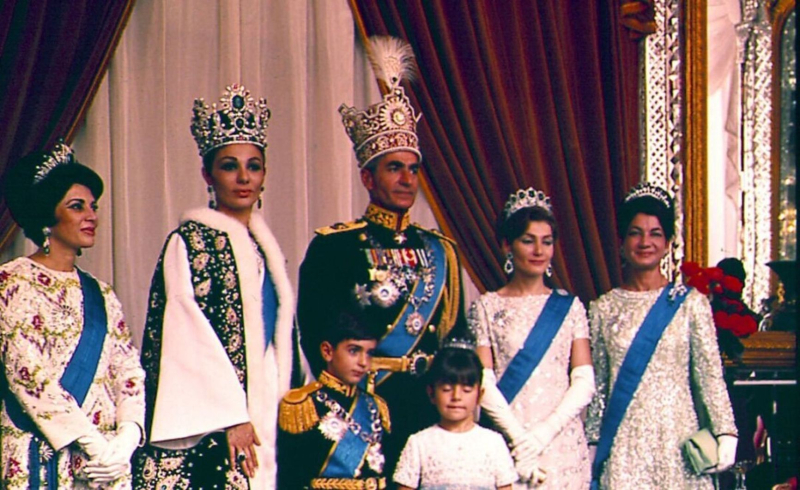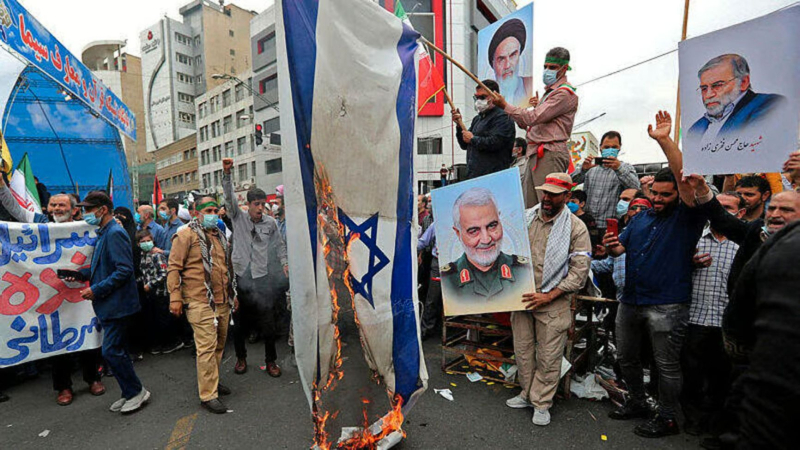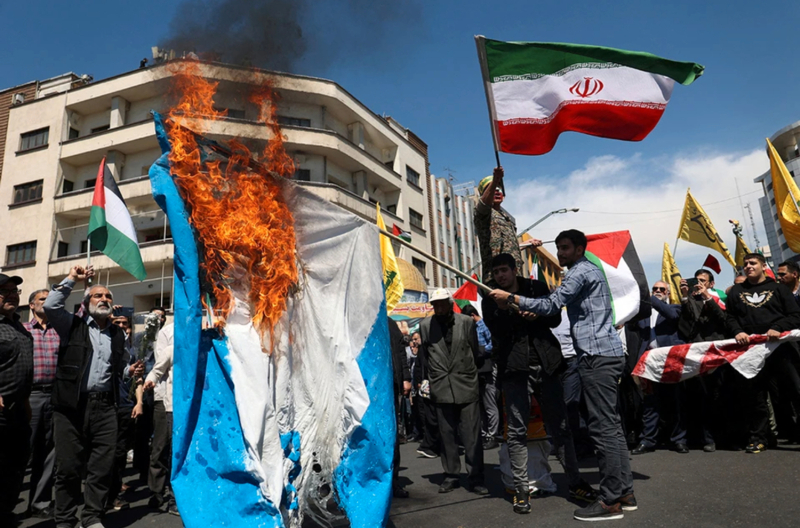The ideology of modern Iran not only denies Israel’s right to exist — it openly demonizes the Jewish state. Antisemitic rhetoric has become so intrinsic to official Tehran that it’s easy to imagine the two countries have always been adversaries. In reality, the hatred toward Israel stems from propaganda that began to be actively promoted following Iran’s Islamic Revolution of 1979. Back then, the aim was not to wipe Israel off the map, but to create among the Iranian population the impression that the regime was protecting them against an external enemy.
It’s hard to think of anything in the world as complex, tangled, and ancient as Iranian-Israeli (or Persian-Jewish) relations. They span several millennia, most of which were marked by relative peace — and often even close friendship.
Suffice it to say that the only non-Jew praised by the authors of the Old Testament is an Iranian — the Persian king Cyrus the Great. Around 2,500 years ago, Cyrus conquered Babylon, a city whose rulers had recently devastated Israel, destroying the Temple in Jerusalem and deported most of the Jewish population. After defeating the Babylonians, Cyrus freed the Jews, allowing them to return home and rebuild the Temple. In turn, he earned the title of “God’s anointed” in the Old Testament.
Paradoxically, it is Cyrus the Great who became a symbolic figure at the origins of the modern-day conflict between two ancient civilizations. In 1971, Iran’s Shah Mohammad Reza Pahlavi celebrated the 2,500th anniversary of the Iranian monarchy with unprecedented pomp. In today’s terms, the festivities cost more than half a billion dollars. With that money, an entire city was built near Cyrus’s tomb in ancient Persepolis to host foreign dignitaries and domestic elites.
The Shah raised toasts to King Cyrus and praised both his real and fictional deeds while standing among gold-adorned tents and reviewing parades of soldiers dressed in ancient Persian armor, much to the outrage of the country’s religious opposition. The blatant disregard for Islamic norms — the open consumption of alcohol, the revealing outfits of the female guests, and the organizers’ flirtation with pre-Islamic (especially Zoroastrian) symbolism — deeply angered Ruhollah Khomeini, who publicly called the Shah a traitor to both the people and the faith.
“The crimes of Iran’s kings cast a shadow over our history. Even the ones that were considered good were, in reality, treacherous and cruel. Islam fundamentally opposes the very idea of monarchy,” Khomeini declared at the time, accusing the Shah of funding the Persepolis party with money obtained from oil sales to Israel.
Indeed, part of the colossal sum spent on the controversial festivities came from cooperation with Israel. And a significant portion of Iranian society saw nothing wrong with that.
Part of the colossal sum spent on the controversial festivities came from cooperation with Israel
David Menashri, a leading contemporary Israeli Iranologists, wrote that the two nations got along remarkably well during the monarchy thanks to their shared national characteristics: both Israelis and Persians take pride in the ancient roots of their civilizations, both are among the few non-Arab nations in the Middle East; and the religions of both peoples differ radically from the Sunni Islam practiced by most of their neighbors. All of these similarities nurtured close ties.
In 1950, Iran was the second country in the Islamic world to recognize Israel (after Turkey), albeit without establishing official diplomatic missions. Under the Shah, Iran purchased small arms and missiles from Israel, had its civilian aircraft serviced there, invited Israeli agronomists and engineers to work in Iran, and came to Israel’s aid when the Soviet Union decided to halt oil sales to the Jewish state in the late 1950s.
Israel was likely among the original backers of Iran’s nuclear program. At the time, it would have been hard to imagine that everything would soon change so drastically.
Israel was likely among the original backers of Iran's nuclear program
But Iranian-Israeli cooperation also had a dark side. The Shah’s regime was far from democratic, and it demonstrated a blatant disregard for human rights. Iranian security services engaged in persecution, torture, and even the assassination of dissidents. Many of Iran's security personnel had received training in Israel, as the two countries formally shared the same enemies: followers of aggressive Pan-Arabism who had ambitions across the Middle East. A common enemy and shared strategic interests brought the two capitals closer together — to the point that their military and intelligence cooperation was barely concealed.

However, officers of the Shah's army and security services who trained in Israel also used the knowledge they gained to suppress opposition. Israel stood firmly and openly with the Shah, and Israelis working in Iran at the time later admitted they were aware of how the regime dealt with its domestic enemies, but they chose to turn a blind eye. Some did so for purely material reasons, as jobs in Iran often paid far better than those at home. Others acted out of ideology, believing that for the sake of their country’s security — surrounded as it was by hostile Arab states — it was necessary, even essential, to support their ally, the Shah.
Officers of the Shah's army and security services who trained in Israel used the knowledge they gained to suppress opposition at home
The religious opposition cursed Shah Pahlavi and called him Yazid — the most hated and fearsome name in the Shiite world. Yazid was an Umayyad caliph, a late-7th-century Islamic ruler. To maintain his power, he ordered the killing of Hussein, the Prophet Muhammad’s grandson. This atrocity became one of the key events leading to the split of Islam into Sunni and Shiite branches.
Shiites, whose religious doctrine is based on the belief that leadership in the Islamic world should belong to the Prophet’s descendants, consider Yazid to be the embodiment of everything most abhorrent on earth. Shiite tradition portrays him as a usurper, a drunkard, a gambler, and a weak-willed man who was manipulated by self-interested members of his clan.
Shiite propaganda portrayed Shah Mohammad Reza Pahlavi — under whose rule alcohol was freely sold, women wore pants, and licenses to open casinos were relatively easy to obtain — as the new Yazid.
The persecution of the religious opposition was compared to the killing of Hussein, and Israelis played the symbolic role of the “clan” manipulating the Shah. They were numerous, had no regard for Islamic law, and were noticeably more affluent than most Iranians. It was widely known that they had helped the authorities build the repressive apparatus. In other words, the Israelis became the perfect scapegoat.
Audio cassettes with recordings of sermons by Khomeini and his followers — the main medium of revolutionary propaganda in Iran — convinced listeners that the bloody story of Yazid they had known since childhood was being repeated in the here and now. They were told that people in the villages were growing poorer, and believers were being persecuted — all because of the Jews, who controlled the weak-willed and godless Shah.
“Israel does not want the Quran to be honored in this country. Israel does not want mullahs to exist here. It wants to seize our country’s economy and appropriate your wealth. The theologians oppose these actions by Israel, and because of this, they are being persecuted,” one such sermon declared.
“Israel does not want the Quran to be honored in this country. Israel does not want mullahs to exist here,” one Shiite sermon declared
The ayatollahs, perhaps unknowingly, perfectly followed the principles of information warfare. They explained the people’s poverty as being the result of the cunning schemes of foreigners in the employ of the Shah, who placed the pagan Cyrus the Great above the Shiite imams and showed little concern for upholding Islamic norms. “You are poor only because you are ruled by godless enemies of the faith,” the propagandists argued. “Help us overthrow them, and your suffering will end.”
Israelis became a very convenient target for the new regime’s propaganda. Once the revolutionary slogans took effect, the monarchy collapsed, and the Islamic Republic of Iran was proclaimed. Its first Supreme Leader, the very same Ayatollah Khomeini, deliberately chose to name the new state the Islamic Republic rather than the Shiite Republic. He hoped the revolution would spread beyond Iran and that Tehran would become the center of the Islamic world. But the main obstacle on this path was Iranian Shiism itself.
Shiites make up far fewer Muslims worldwide than Sunnis — no more than 20%. Apart from Iran, only two Middle Eastern nations are predominantly Shiite: Iraq, which has been ruled by Sunnis for most of its modern history, and Bahrain, where a Sunni royal dynasty holds power.
For many Sunnis, Shiites are heretics, betrayers of true Islam. To genuinely claim leadership in the Islamic world, Shiite Iran needed to find a way to prove to the Sunnis its commitment to shared values and its concern for the Sunnis' well-being. Here Israel, which had occupied Palestinian lands populated largely by Sunni Muslims as a result of several wars, once again became the perfect target for propaganda attacks.
As early as 1979, Iran officially marked Quds Day — a holiday established by Khomeini himself to demonstrate solidarity with the Palestinians. To this day, the most popular slogans carried on banners during the annual marches are “Death to Israel” and “Israel will be wiped off the pages of history.”
Iran's anti-Israel activities were not limited to slogans. Tehran openly supported Palestinian militant groups that have declared the destruction of Israel to be their goal — arming, sponsoring, and training their commanders. Despite being Sunni, the largest of these groups, Hamas and the Islamic Jihad Movement in Palestine, have reportedly received up to $100 million in annual Iranian aid.
Tehran is arguably a global leader in using proxy forces in conflicts with its adversaries — a champion of waging wars with someone else's hands. Originally, these proxies were created as the main instrument for spreading the fire of the Islamic Revolution, which the ayatollahs still hope will ignite across the Middle East, if not worldwide.
Iran’s various proxies are not united by ideology, where Shiite Hezbollah differs dramatically from Sunni Hamas. Some are quasi-state actors, like the Houthis, who control a significant portion of Yemen, print their currency, and pursue a relatively independent foreign policy. Others are small rural militias of 10–15 fighters hunkering down somewhere out in the Syrian desert or Iraqi mountains. But all of them are oriented toward Tehran and act in its interests.
However, the Islamic Revolution is just one vector of Tehran’s current interests. These groups — numbering in the dozens in Iraq alone — serve as Iran’s “land-based mosquito fleet,” capable of stretching the frontlines of a major war across hundreds or even thousands of kilometers, well beyond Iran’s own borders. Given the Islamic Republic’s decades-long hostility toward Israel, the most combat-capable of these groups are positioned as close as possible to the borders of the Jewish state. Tehran’s main proxies have, until recently, literally encircled Israel from three sides — operating in the Palestinian territories, Lebanon, and Syria.

Syria essentially functioned as a full-fledged proxy state, heavily supplied with Iranian money and weapons. Iran deployed its best combat units to the country and desperately tried to keep Damascus under its control. Largely, this was done in order to maintain Syria as a buffer against any potential large-scale Israeli attacks. The mere possibility of an invasion into Israel from neighboring Syria — whether by Assad’s regular army or by Iran’s well-armed “rural proxies” — was meant to tie down Israeli forces and hinder any aggressive plans against Iran.
For a long time, this approach appeared to work, albeit imperfectly. True, Israel carried out daring operations to eliminate military targets in Iran and orchestrated assassinations of scientists involved in the Iranian nuclear program. But it is hardly a coincidence that Israel undertook a large-scale operation involving hundreds of combat sorties all across Iran only after the collapse of Assad’s regime in allied Syria, and after Hamas and Hezbollah were seriously weakened during the ongoing conflict in Gaza and the border areas of Lebanon.
Interestingly, despite the eschatological mysticism deeply embedded in the Shiite theocracy, hostility toward Israel was for a long time framed in geopolitical, rather than religious, terms. Traditionally, the anti-Israel rhetoric of officials in Tehran centered on rejecting the occupation of Palestinian lands and criticizing Zionism as the ideology justifying that occupation. However, during Mahmoud Ahmadinejad’s presidency, the anti-Israel propaganda took on an openly antisemitic tone.
During Mahmoud Ahmadinejad’s presidency, the anti-Israel propaganda took on an openly antisemitic tone
Ahmadinejad hosted Holocaust denial forums in Iran, claimed that the mass extermination of Jews during World War II was a hoax, and called for the swift destruction of Israel. Iranologist Ali M. Ansari notes that Ahmadinejad’s obsession with these ideas stems from his particular brand of piousness.
As Ansari writes, Ahmadinejad views the primary goal of the Islamic Republic as bringing about the triumph of Shiite Islam across the entire globe and sees the destruction of the Jewish state as a necessary step on that path. From his perspective, Israel is built on values that contradict the Shiite worldview.

Surprisingly, state support for anti-Israel and even antisemitic ideology has not turned Iranian society into a Judeophobic mass. On the contrary, public opinion studies show that the percentage of antisemites in Iran is significantly lower than in other countries in the region. Moreover, Israel occasionally provides assistance to its sworn enemy — even if only unofficially.
During the Iran-Iraq War of 1980-1988, Israel’s support helped save the newly established Islamic Republic from being crushed by Saddam Hussein’s armies. After the revolution, Iran was under international sanctions and could not purchase ammunition and spare parts for its armored vehicles directly from Western companies, and so Israeli intermediaries stepped in, facilitating the delivery of hundreds of desperately needed missiles and other military supplies to Iran.
The percentage of antisemites in Iran is significantly lower than in other countries in the region
In addition, the Israeli Air Force destroyed key facilities belonging to Iraq’s nuclear program, where nuclear weapons were ostensibly being developed in order to be used to strike Iran. From Israel’s perspective, the authoritarian and openly anti-Israeli Hussein appeared to be a far more dangerous enemy than the recently established — and still vulnerable — regime of the ayatollahs.
Today, the former friendship is being leveraged by Israeli propaganda. Amid the ongoing war, members of the Israeli Knesset published an appeal to the Iranian people, stating that they do not equate ordinary Iranians with the ruling regime and that they are ready to renew good relations with Iran as soon as the ayatollahs fall. Moreover, the MPs urged Iranians to actively contribute to its downfall rather than wait for it.
“We write to you not as rivals, but as partners in a shared struggle — against tyranny, against extremism, against the silence that fear imposes… The world is watching. This is your moment — to rise on your own terms and reclaim the story of your country,” the message read.



